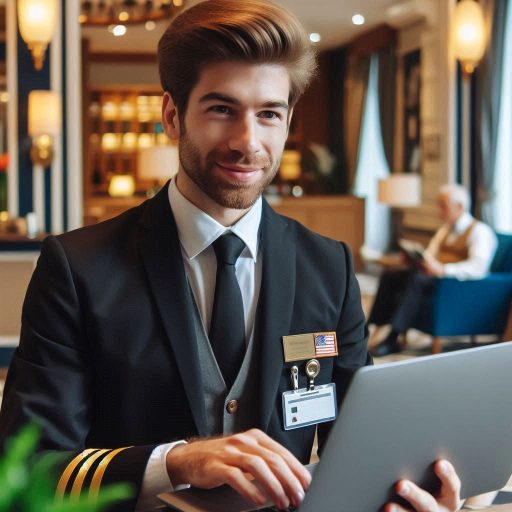Introduction
A successful hotel management team is essential for effective hotel operations.
This team drives performance, enhances service quality, and fosters a positive work environment.
Strong leadership and collaboration among team members create a culture of excellence.
A cohesive management team ensures clear communication and shared goals.
When team members work together, they streamline operations and solve problems efficiently.
This teamwork minimizes misunderstandings and enhances overall productivity.
Improved guest satisfaction directly stems from a well-functioning management team.
When staff members are aligned and motivated, they provide exceptional service.
Happy employees often lead to happy guests, creating memorable experiences.
Satisfied guests are more likely to return and recommend the hotel to others.
Increased revenue also results from a strong hotel management team.
Effective teams identify opportunities for upselling and enhancing guest experiences.
They implement strategies that attract new customers and retain existing ones.
Moreover, a successful team monitors performance metrics to optimize operations.
By analyzing data, they can make informed decisions that boost profitability.
In summary, building a successful hotel management team is vital for operational excellence.
This team leads to improved guest satisfaction and increased revenue, ensuring long-term success in the hospitality industry.
Understanding the roles and responsibilities of each team member
The Key Positions in a Hotel Management Team
Building a successful hotel management team requires understanding key positions.
Each role plays a crucial part in hotel operations.
A well-rounded team ensures efficient service and guest satisfaction.
The following are essential positions in a hotel management team.
General Manager
The general manager oversees the entire hotel operation.
They set the hotel’s vision and strategic goals.
This position manages budgets and financial performance.
The general manager ensures that all departments work cohesively.
They also handle guest complaints and high-level decisions.
Regularly, they meet with department heads to review performance and address issues.
Front Desk Manager
The front desk manager supervises the front desk staff.
This role involves managing guest check-ins and check-outs efficiently.
They ensure excellent customer service at all times.
The front desk manager also coordinates room assignments and reservations.
This position handles guest inquiries and resolves complaints swiftly.
Training front desk staff on systems and procedures is another vital responsibility.
Housekeeping Manager
The housekeeping manager is responsible for maintaining cleanliness throughout the hotel.
This role oversees the housekeeping staff and assigns daily tasks.
They ensure that rooms and public areas meet cleanliness standards.
The housekeeping manager manages inventory for cleaning supplies and linens.
They also develop schedules to optimize staff efficiency.
Conducting regular inspections helps maintain high standards.
Sales and Marketing Manager
The sales and marketing manager drives revenue by attracting guests.
They develop promotional strategies and campaigns to increase bookings.
This role analyzes market trends to identify opportunities.
The sales and marketing manager builds relationships with travel agencies and local businesses.
They also oversee the hotel’s online presence and social media marketing efforts.
Food and Beverage Manager
The food and beverage manager oversees all dining operations.
This role includes managing restaurants, bars, and catering services.
They ensure high-quality food and service standards are maintained.
The food and beverage manager also develops menus and pricing strategies.
They handle vendor relationships and monitor inventory levels.
Regularly, this manager coordinates special events and promotions.
Maintenance Manager
The maintenance manager ensures the hotel is in good working condition.
This role oversees all maintenance staff and activities.
They schedule regular inspections and repairs for equipment and facilities.
The maintenance manager manages relationships with contractors and vendors.
They also ensure compliance with safety regulations and standards.
The Specific Duties and Responsibilities of Each Role
The general manager provides leadership and strategic direction for the hotel.
They ensure all departments operate smoothly and cohesively.
The front desk manager ensures a seamless guest experience through efficient check-in and check-out processes.
They train and supervise front desk staff, maintaining high service standards.
The housekeeping manager is responsible for cleanliness and hygiene.
They oversee housekeeping staff, manage cleaning supplies, and conduct inspections.
The sales and marketing manager focuses on revenue growth.
They create promotional campaigns, analyze market trends, and maintain relationships with partners.
The food and beverage manager ensures exceptional dining experiences.
They oversee restaurant operations, develop menus, and maintain quality standards.
Finally, the maintenance manager ensures the hotel remains in good repair.
They supervise maintenance staff, schedule inspections, and ensure safety compliance.
By understanding the specific duties and responsibilities of each role, hotel owners can assemble a skilled team.
A well-structured management team ultimately leads to improved guest satisfaction and operational success in the hospitality industry.
Read: How to Handle Emergency Situations in Pet Grooming
Recruiting and hiring the right team members
Tips for Attracting Top Talent in the Hospitality Industry
Attracting top talent in the hospitality industry requires a strategic approach.
First, create a strong employer brand that showcases your hotel‘s values.
Highlight your commitment to employee development, diversity, and inclusivity.
Use social media platforms to share success stories and employee testimonials.
Offer competitive salaries and benefits to draw candidates.
Research industry standards to ensure your compensation packages are appealing.
Consider offering flexible working hours to accommodate different lifestyles.
Many candidates value work-life balance highly, especially in the hospitality sector.
Promote opportunities for career advancement within your organization.
Showcase your hotel‘s training programs and leadership development initiatives.
Candidates are more likely to apply if they see potential for growth.
Highlighting a clear career path can set your hotel apart from competitors.
Engage with local hospitality schools and universities.
Establish internship programs to attract students and recent graduates.
Collaborating with educational institutions can build a pipeline of talent.
Host career fairs or workshops to connect with aspiring hospitality professionals.
Leverage employee referrals to find top talent.
Encourage current employees to recommend potential candidates.
Often, team members can identify individuals who fit your hotel culture.
Offer incentives for successful referrals to motivate staff participation.
Additionally, utilize online job boards and recruitment platforms.
Post detailed job descriptions that outline roles and responsibilities clearly.
Emphasize the unique aspects of your hotel to attract the right candidates.
Target platforms that cater specifically to the hospitality industry for better results.
Finally, participate in industry events and conferences.
Networking at these events can help you meet potential hires.
Building relationships with industry professionals can lead to discovering hidden talent.
Importance of Conducting Thorough Interviews and Background Checks
Conducting thorough interviews is crucial when building a successful hotel management team.
A well-structured interview process helps identify the best candidates.
Prepare relevant questions that assess both skills and cultural fit.
Utilize behavioral interview techniques to gauge past performance.
Asking candidates about specific situations reveals how they handle challenges.
This approach provides insight into their problem-solving abilities and interpersonal skills.
Involve multiple team members in the interview process.
Different perspectives can help evaluate candidates more comprehensively.
Team members can provide feedback on how well candidates might fit into the existing team dynamics.
Conducting background checks is equally important.
These checks verify candidates’ qualifications and work history.
They help ensure you hire individuals with the right skills and experience.
Background checks can also reveal any potential red flags in a candidate‘s past.
Consider conducting reference checks to gather additional insights.
Speaking with former employers can provide valuable information about a candidate’s work ethic and reliability.
This feedback helps confirm the candidate’s suitability for your hotel.
Finally, maintain clear communication with candidates throughout the hiring process.
Keeping candidates informed fosters a positive candidate experience.
A good experience can enhance your hotel‘s reputation, making it easier to attract future talent.
Attracting top talent in the hospitality industry requires strategic efforts.
Creating a strong employer brand, offering competitive benefits, and engaging with educational institutions can help.
Thorough interviews and background checks ensure you select the right candidates for your hotel management team.
By following these strategies, you can build a successful and effective team.
Read: How Much Do Pet Groomers Earn in the USA?
Training and developing team members
Implementing a Comprehensive Training Program for New Hires
Building a successful hotel management team starts with effective training for new hires.
A comprehensive training program ensures all employees understand their roles.
The program should cover essential topics, such as customer service, safety protocols, and operational procedures.
Training should begin on the first day of employment.
Orientation sessions introduce new hires to the hotel‘s culture and values.
This initial engagement helps set the tone for their employment.
Pairing new hires with experienced mentors fosters guidance and support during the transition.
Hands-on training is crucial for practical skills development.
New employees should shadow experienced team members in various departments.
This approach allows them to learn directly from seasoned professionals.
Role-playing scenarios can also enhance their customer service skills and problem-solving abilities.
Regular assessments throughout the training process help ensure understanding.
Managers should evaluate new hires’ skills and knowledge at various stages.
This feedback allows for adjustments in training methods as needed.
Providing constructive feedback helps new employees grow and develop confidence.
Incorporating technology into the training program can enhance learning.
Online training modules allow new hires to learn at their own pace.
These resources can cover various topics, from software usage to company policies.
Additionally, creating a comprehensive training manual provides a valuable reference for new hires.
Providing Ongoing Professional Development Opportunities for Existing Team Members
Ongoing professional development is essential for retaining talent and enhancing team performance.
Providing continuous training opportunities keeps team members engaged and motivated.
It also helps them stay current with industry trends and best practices.
Regular workshops and seminars can facilitate skill development.
These sessions should cover relevant topics, such as leadership, communication, and conflict resolution.
Encouraging team members to share their expertise during these workshops fosters a collaborative environment.
Mentorship programs can also support ongoing professional growth.
Pairing experienced team members with newer employees fosters knowledge sharing and career guidance.
This relationship helps employees feel valued and encourages personal growth.
Offering access to online courses or certifications is another effective strategy.
Team members can pursue specialized training relevant to their roles.
Providing financial support for continuing education demonstrates investment in their future.
Encouraging attendance at industry conferences and networking events broadens team members’ horizons.
These experiences allow employees to connect with peers and learn from industry leaders.
Exposure to new ideas and trends can inspire innovation within the hotel.
Moreover, conducting regular performance reviews helps identify development needs.
Managers should discuss career goals and aspirations during these evaluations.
This approach enables managers to tailor development opportunities to each employee‘s ambitions.
Creating a culture of continuous learning fosters employee loyalty.
When team members see growth opportunities, they feel more satisfied in their roles.
This satisfaction translates to better performance and improved guest experiences.
Building a successful hotel management team requires a strong focus on training and development.
Implementing a comprehensive training program for new hires sets a solid foundation.
Additionally, providing ongoing professional development opportunities helps retain and engage existing team members.
Together, these strategies create a skilled and motivated team ready to deliver exceptional service.
Read: Top Pet Grooming Conferences and Expos in the USA

Establishing clear communication channels
Importance of Open and Transparent Communication Within the Team
Open and transparent communication is vital for a successful hotel management team.
It builds trust and fosters collaboration among team members.
When employees feel comfortable sharing ideas, they contribute more effectively to the organization.
This atmosphere encourages innovation and problem-solving.
Transparent communication also minimizes misunderstandings and conflicts.
When everyone is on the same page, team dynamics improve.
Employees appreciate knowing their roles and responsibilities clearly.
This clarity enhances accountability and performance across the board.
Moreover, open communication helps identify potential issues before they escalate.
Team members can voice concerns early, allowing for timely resolutions.
Managers should encourage a culture where feedback is welcomed and valued.
This proactive approach ensures a more harmonious work environment.
Effective communication also enhances guest satisfaction.
When staff communicates well, they provide better service to guests.
Clear communication allows for quick responses to guest needs and requests.
This efficiency leads to positive guest experiences and repeat business.
Additionally, regular updates about the hotel’s performance and goals are essential.
Keeping team members informed fosters a sense of belonging and purpose.
Employees who understand the bigger picture are more motivated to contribute.
Strategies for Fostering Effective Communication
Fostering effective communication requires intentional strategies.
Regular team meetings are an excellent starting point.
Schedule weekly or biweekly meetings to discuss updates and address concerns.
This forum allows everyone to share insights and contribute to the conversation.
During meetings, encourage participation from all team members.
Create a safe space where everyone feels comfortable voicing their thoughts.
Use icebreakers or team-building activities to promote engagement and camaraderie.
Feedback sessions are another effective strategy for improving communication.
Schedule one-on-one meetings with team members to discuss performance.
These sessions provide an opportunity for constructive criticism and positive reinforcement.
Managers should actively listen to employee feedback and take action where necessary.
Utilizing technology can also enhance communication within the team.
Collaboration tools like Slack or Microsoft Teams facilitate instant messaging and file sharing.
These platforms allow for quick updates and real-time communication.
Employees can stay connected even when they are not physically present.
Moreover, establishing clear communication channels is crucial.
Define how information will flow within the team.
Designate specific individuals for various topics, such as HR or operations.
This clarity ensures that employees know where to direct their questions or concerns.
Finally, recognize and celebrate achievements during team meetings.
Acknowledging individual and team accomplishments fosters a positive atmosphere.
This recognition motivates employees to continue performing at their best.
Open and transparent communication is essential for building a successful hotel management team.
Implementing strategies such as regular meetings and feedback sessions fosters effective communication.
By prioritizing these practices, hotel managers can create a cohesive team that works well together and excels in delivering exceptional guest experiences.
Strong communication leads to enhanced performance, increased employee satisfaction, and ultimately, a thriving hotel environment.
Read: Educational Requirements for Childcare Workers Explained
Encouraging teamwork and collaboration
Creating a Positive and Inclusive Work Environment
Creating a positive and inclusive work environment is essential for a successful hotel management team.
An inclusive atmosphere fosters collaboration and creativity among staff.
When employees feel valued, they are more engaged and productive.
Managers should actively promote diversity and inclusion within their teams.
Encouraging open communication is vital in building a positive work culture.
Managers must create channels for employees to express their ideas.
Regular team meetings allow everyone to contribute their perspectives.
When staff feel heard, it strengthens their commitment to the organization.
Moreover, recognizing individual contributions boosts morale.
Managers should celebrate achievements and provide positive feedback.
This acknowledgment helps employees feel appreciated and motivates them to excel.
Implementing a recognition program can further enhance this culture of appreciation.
Providing opportunities for professional development is also crucial.
Offering training programs equips staff with new skills and knowledge.
This investment shows employees that the organization cares about their growth.
A well-trained team is more confident and capable of delivering exceptional service.
Additionally, fostering work-life balance is essential for employee well-being.
Managers should encourage staff to take breaks and utilize their vacation time.
Supporting employees‘ personal lives reduces burnout and increases job satisfaction.
A balanced workforce contributes to a more positive and productive environment.
Creating an inclusive work environment also means addressing conflicts promptly.
Managers should encourage open discussions about workplace issues.
Resolving conflicts quickly maintains a healthy atmosphere and promotes teamwork.
When employees feel safe addressing problems, they are more likely to collaborate effectively.
Transform Your Career Today
Unlock a personalized career strategy that drives real results. Get tailored advice and a roadmap designed just for you.
Start NowPromoting a Culture of Teamwork and Mutual Support Among Team Members
Promoting a culture of teamwork and mutual support is vital for a hotel management team‘s success.
A strong sense of teamwork leads to improved communication and collaboration.
Managers should encourage staff to work together on projects and tasks.
Team-building activities can strengthen relationships and enhance trust among team members.
Establishing clear roles and responsibilities helps foster teamwork.
When employees understand their contributions, they feel more invested in their work.
Defining expectations allows team members to collaborate effectively and achieve common goals.
Regular check-ins can help ensure everyone stays aligned and accountable.
Encouraging peer-to-peer support is also essential.
Managers should create opportunities for team members to mentor one another.
This approach fosters a sense of community and helps employees grow together.
When staff members support each other, they build a more cohesive team.
Moreover, celebrating team achievements reinforces the culture of teamwork.
Managers should acknowledge collective successes during meetings or events.
Recognizing the efforts of the entire team boosts morale and motivates continued collaboration.
It also highlights the importance of working together toward shared goals.
Creating an environment where feedback is encouraged enhances teamwork.
Managers should facilitate regular feedback sessions among team members.
Constructive feedback promotes continuous improvement and helps employees develop.
This openness fosters a culture of trust and collaboration.
In short, building a successful hotel management team requires creating a positive and inclusive work environment.
Promoting teamwork and mutual support among team members enhances overall performance.
By focusing on these aspects, hotel managers can cultivate a motivated, engaged, and high-performing team.
Ultimately, this investment in team culture contributes to the hotel‘s long-term success and guest satisfaction.
Discover More: Top Networking Tips for Service Industry Workers
Setting Clear Goals and Expectations
Establishing Key Performance Indicators (KPIs) for Each Team Member
Establishing key performance indicators (KPIs) is crucial for a successful hotel management team.
KPIs provide measurable goals for each team member.
These indicators help track progress and ensure alignment with the hotel‘s objectives.
Start by defining relevant KPIs for each department.
For example, front desk staff might focus on guest satisfaction ratings.
Housekeeping teams could target cleanliness scores and timely room turnovers.
Tailoring KPIs to specific roles ensures accountability and clarity.
Involve team members in the KPI-setting process.
Discuss goals collaboratively to foster ownership and commitment.
When employees have a say, they are more motivated to achieve their targets.
Regularly review and update KPIs based on performance and changing circumstances.
Flexibility ensures that the goals remain relevant and attainable.
Conduct monthly or quarterly reviews to assess progress and adjust KPIs as needed.
Provide ongoing training to help team members meet their KPIs.
Equip staff with the tools and knowledge necessary for success.
This support fosters a culture of continuous improvement and professional development.
Recognize and reward achievements related to KPIs.
Celebrating successes boosts morale and encourages a high-performance culture.
When team members see their efforts acknowledged, they feel more invested in their roles.
Additionally, track KPI results using performance management software.
This technology streamlines the process of monitoring progress.
It allows managers to identify areas needing attention and celebrate milestones more effectively.
Communicating Clear Goals and Expectations
Communicating clear goals and expectations is essential for driving motivation and accountability.
Hotel managers should articulate the hotel‘s vision and objectives to all staff.
This communication creates a shared understanding of the hotel‘s mission.
Start with a kickoff meeting at the beginning of each quarter.
Outline the key objectives and expectations for the team.
Encourage questions and discussions to ensure everyone is on the same page.
Use regular team meetings to reinforce goals and provide updates.
These meetings create a platform for open dialogue about progress and challenges.
Staff should feel comfortable discussing obstacles they face in achieving their objectives.
Incorporate visual aids, such as goal charts or dashboards, to keep expectations visible.
Displaying progress helps maintain focus and motivation.
Team members can see how their contributions impact overall success.
Encourage team members to set individual goals that align with the hotel‘s objectives.
This personal accountability fosters a sense of ownership.
When employees feel personally invested, they are more likely to strive for excellence.
Provide feedback regularly to help staff stay on track.
Constructive feedback should highlight areas for improvement and celebrate successes.
This ongoing communication fosters a culture of trust and continuous growth.
Moreover, create a supportive environment where team members can share ideas and challenges.
Encourage collaboration to address any obstacles preventing goal achievement.
This teamwork fosters camaraderie and strengthens the overall team dynamic.
All in all, establishing KPIs and communicating clear goals are vital for building a successful hotel management team.
By defining measurable indicators and fostering open communication, managers can drive motivation and accountability.
These practices lead to enhanced team performance and improved guest satisfaction, contributing to the hotel‘s overall success.
Conclusion
Building a successful hotel management team is essential for overall business success.
This blog covered several key points to achieve this goal.
First, hiring the right talent is crucial.
Look for individuals with relevant experience and a passion for hospitality.
Effective communication fosters a positive team environment.
Regular meetings and open dialogue help address challenges and celebrate successes.
Encouraging collaboration among team members enhances problem-solving and creativity.
Training and development are vital for continuous improvement.
Providing ongoing education equips staff with the skills needed for success.
This investment shows employees that their growth matters.
Additionally, establishing clear roles and responsibilities ensures accountability.
Each team member should understand their contributions to overall goals.
This clarity promotes a sense of ownership and commitment.
Final thoughts emphasize the importance of building a strong hotel management team.
A cohesive team drives excellent guest experiences and operational efficiency.
By prioritizing teamwork and effective leadership, hotels can create a culture of excellence.
A successful management team not only increases guest satisfaction but also boosts employee morale.
Ultimately, investing in a strong hotel management team lays the foundation for sustainable growth and success in the hospitality industry.
[E-Books for Sale]
The Big Book of 500 High-Paying Jobs in America: Unlock Your Earning Potential
$19.99 • 500 High-Paying Jobs • 330 pages
Explore 500 high-paying jobs in America and learn how to boost your career, earn more, and achieve success!
See All 500 High-Paying Jobs of this E-Book
1001 Professions Without a Degree: High-Paying American Jobs You Can Start Now
$19.99 • 1001 Professions Without a Degree • 174 pages
Discover 1001 high-paying jobs without a degree! Unlock career tips, skills, and success strategies for just $19.99!




